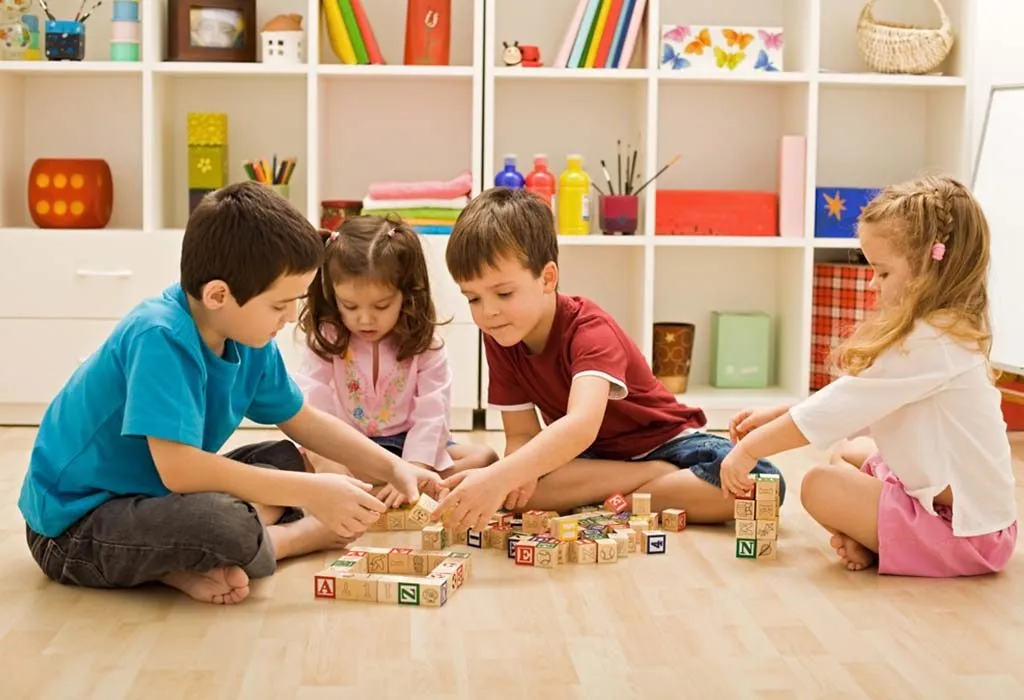How to Develop Positive Thinking & Attitude for Children in Life – 14 Tips
As parents, we want our children to excel in all spheres of life. To succeed in life, one must have a positive attitude. If a child is confident and thinks positively, he can achieve anything he wants in life. There are many things you can do to encourage positive behaviour in children. Read this article to know how you can help your children develop a positive attitude.
One of the most effective ways to foster positivity in your children is by being a positive role model. Children often emulate the behaviours and attitudes they observe in their parents. Engaging in activities that promote self-esteem and resilience also plays a crucial role in their development.
Why Is It Important to Develop Positive Attitude in Children?
Having a positive attitude in life can help children overcome any problem in life. If a child thinks positively, he will be able to solve problems quickly and will learn to look at various aspects of life with positivity. A small setback can affect children negatively, but they should understand it is not the end of everything. If they remain positive in difficult situations, they will be able to come out of it quickly. Positivity can also make children resilient. You should not force your children to dismiss negative thinking or emotions but help them deal with these emotions and move on.
What Makes a Child Develop a Negative Attitude?
If you observe your child exhibiting negative behaviour, there are chances that he may be doing so because of the following issues:
- If you have imposed too many restrictions on your child.
- If you as a parent express too much negativity.
- If you are overprotective.
- If your child is suffering from psychological issues.
- If there is a disturbed environment at home.
- If a child experiences a lot of criticism then he may become negative in life.
Tips to Foster Positive Thinking in Children
Here are some ways that you can try to develop positive attitude in children.
1. Let them know that it is okay to express their feelings
One of the most important ways to help your children embrace positivity in life is by letting them acknowledge their emotions. Be it sadness, happiness, fear, shame, anxiety or any other emotion, tell them that it is normal to be happy or sad at times. Once they learn to accept these feelings, there will be no room for negativity. If your child is unhappy or angry, ask him about his problem. Once he lets you know his problem and his feelings, make him understand that these clouds of negativity will pass. Tell him that he should try to look for solutions instead of worrying about the problem. This way he will understand that every problem has a solution. Your child will soon learn to look at things positively.
2. Be a role model
Children learn a great deal from their parents. If you remain positive in life, your kids will develop the same attitude. You may not be aware, but your children observe your every action, feelings, and emotions. Slowly and gradually they start following whatever you think or believe. Show them that remaining positive in the face of adversity and everything that follows is possible and can be good. This will help them develop a positive attitude.
3. Encourage and motivate your kids
If your children feel dejected or demotivated, encourage them to look at the positive things in life. Appreciate them when they succeed in something and do not scold them if they make mistakes. If ever your child misbehaves, do not scold him. Explain to him politely that this kind of behaviour is not acceptable and teach him how to correct his mistake. When you explain to children how to rectify their mistakes, you instil positivity in them.
4. Give them freedom
It is important to exercise discipline in children , but at the same time, they must be given their freedom too. Sometimes, it is okay to let children do things in the manner they want. Let them pursue their dreams and desires.
5. Let your kids be surrounded by positive people
The people we are friends with influence us greatly and if we are surrounded by positive people it impacts the way we perceive things too. Same holds true for a child; therefore, make sure your kiddo is in the company of happy and positive people.
6. Encourage them to talk about positive events
It is good to learn about your child’s day, however, make sure you lay more emphasis on positive events rather than laying stress on the negative ones. Show them that positive events have the power to trump negative events. Encouraging them to focus on positive events and emphasizing on their importance will help them realize that a positive attitude towards daily incidents, in general, can give them a stress-free day. Ultimately, they’ll lean more towards a positive attitude in life.
7. Teach morals and values to them
A child who knows what is right and wrong turns out to be more positive in life than children who don’t, and this can happen when you teach morals and values to your child from the beginning. When your children know their values, they know that they are in the right. If they stick to morals and do the right thing, they will have no guilt, doubts, or regrets about wrong-doings. In the absence of fear, guilt and doubt, kids will find it easier to develop a positive attitude.
8. Encourage positivity through stories and games
Positivity can be imbibed in children by narrating positive stories to them and engaging them in positive attitude activities for kids. You can also indulge your children in positive thinking activities and games. This way your child will learn valuable lessons in a fun way.
9. Foster a growth mindset
Teach your children that abilities and intelligence can be developed through hard work and perseverance. When they face challenges, remind them that effort leads to improvement and that mistakes are opportunities to learn. Encouraging a growth mindset helps children stay positive even when things are tough.
10. Practise gratitude
Encourage your children to express gratitude daily. Whether through a gratitude journal or simply discussing things they are thankful for, this practice can shift their focus from what they lack to what they have. Gratitude fosters a positive outlook on life and helps children appreciate the good around them.
11. Use positive language
The words we use can significantly impact our mindset. Teach your children to use positive language when speaking about themselves and others. Replacing negative statements with positive affirmations can help them build self-esteem and a more optimistic view of life.
12. Limit exposure to negativity
Monitor and manage your child’s exposure to negative influences, including media, social interactions, and environments. Shielding them from excessive negativity helps maintain their positive attitude and prevents the undue influence of pessimistic viewpoints.
13. Create a positive environment
Surround your children with positivity at home by creating a warm, supportive, and encouraging atmosphere. Displaying positive quotes, celebrating small achievements, and maintaining a cheerful ambiance can contribute to their overall positivity and well-being.
14. Encourage physical activity
Physical activity has a profound impact on mental well-being. Encourage your children to engage in regular exercise, whether it’s through sports, dancing, or simply playing outside. Physical activity releases endorphins, which are natural mood lifters and helps children feel more energetic and positive.
Things You Should Avoid While Developing Positive Thinking in Your Child
Developing positive thinking in your child requires careful attention and awareness of certain pitfalls. While fostering positivity is important, avoiding these common mistakes is equally crucial to ensure your efforts are effective and beneficial.
1. Avoid Criticism and Negative Remarks
Criticism and negative remarks can severely impact a child’s self-esteem and confidence. Instead of pointing out their flaws, focus on constructive feedback that guides them on how to improve. Encourage their efforts and highlight their strengths to promote a positive self-image.
2. Don’t Overprotect Them
Shielding your child from every failure or negative experience can hinder their ability to develop resilience. Allow them to face challenges and learn from their mistakes. This helps them build coping skills and understand that setbacks are a natural part of life.
3. Avoid Comparisons
Comparing your child to others can lead to feelings of inadequacy and low self-worth. Celebrate their unique qualities and achievements, encouraging them to strive for personal growth rather than measure themselves against others.
4. Don’t Overemphasize Achievements
While it’s important to recognize and celebrate achievements, placing too much emphasis on success can create pressure and anxiety. Encourage a balanced approach where effort and personal development are valued just as much as the outcomes.
5. Avoid Negative Role Modeling
Children learn by observing their parents. Displaying negative behaviours or attitudes can undermine your efforts to instil positivity. Strive to be a positive role model by handling stress and challenges with a constructive mindset.
6. Don’t Dismiss Their Feelings
Dismissing or minimising your child’s emotions can make them feel invalidated and misunderstood. Acknowledge their feelings and provide support and empathy. This helps them feel valued and encourages open communication.
7. Avoid Inconsistent Discipline
Inconsistent discipline can confuse children and undermine their sense of security. Establish clear and consistent rules and consequences to provide a stable environment. This helps children understand boundaries and fosters a sense of trust and safety.
FAQs
1. Can travel and exposure to different cultures influence my child’s positivity?
Yes, travel and exposure to different cultures can significantly bring about a positive mindset for kids. Experiencing diverse cultures broadens their perspective, fosters empathy, and enhances their appreciation for different ways of life. This exposure can make them more open-minded, adaptable, and positive in their interactions with others and in facing new experiences.
2. How does diet and nutrition affect a child’s positive attitude?
Diet and nutrition play a crucial role in a child’s mood and overall mental well-being. A balanced diet rich in vitamins, minerals, and omega-3 fatty acids supports brain health and can improve mood stability. Avoiding excessive sugar and processed foods helps prevent mood swings and irritability, contributing to a more positive attitude.
Having a positive attitude toward life can help children overcome any problem in life. We hope this article will help you instil positivity in children.
Also Read:
Essential Life Lessons for Kids
Tips to Discipline a Talkative Child
How to Control Super Competitive Kid?
How to Teach Your Kid to Behave Well?
Was This Article Helpful?
Parenting is a huge responsibility, for you as a caregiver, but also for us as a parenting content platform. We understand that and take our responsibility of creating credible content seriously. FirstCry Parenting articles are written and published only after extensive research using factually sound references to deliver quality content that is accurate, validated by experts, and completely reliable. To understand how we go about creating content that is credible, read our editorial policy here.
























